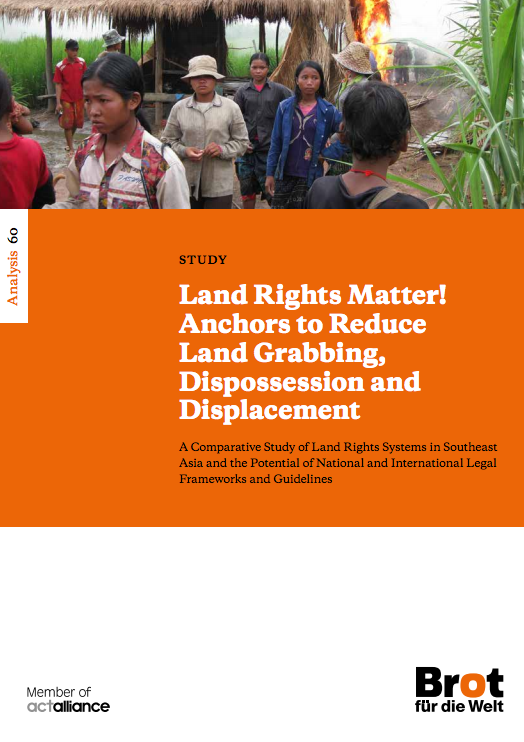Resource information
“It is paradoxical but hardly surprising that the right to food has been endorsed more often and with greater unanimity and urgency than most other human rights, while at the same time being violated more comprehensively and systematically than probably any other.”
Richard Cohen, in Causes of Hunger, 1994
Within South East Asia a huge amount of arable land is already under concessions for large-scale projects by international and national companies. Intensification of the agricultural productivity through the enhancement of external investments is one priority of national policies towards food security and economic development. Where large parts of land are seized, land conflicts are numerous. The land ownership and tenure rights, mostly traditional and customary rights of the local people are often not respected, local villagers are evicted without fair compensation or forcefully displaced. Demonstrations against the loss of lands are often ending with violence by security forces against the people who ask for respect of their legitimate land rights. Human rights violations and direct violence against local actors are widespread, societal conflicts about land and the management of related natural resources are intensified. Especially women and the poor and marginalized parts of the societies, e.g. indigenous groups but also small-holder farmer families and informal tenants of land are suffering as their livelihood is depending on the natural resources like land, water, wood and fisheries, that they lose out to investors. Raising poverty in vast parts of the South East Asian rural population and thus increasing inequity are major challenges for sustainable development and just and peaceful societies.
Bread for the World has started to systematically work together with partner organizations from South East Asia towards the Right to Food and food sovereignty. In combination with that the focus lies on land rights, natural resource management and conflict transformation. In various parts of the region our partner organizations as well as other civil society actors, farmer associations and communities face criminalization and imprisonment while they advocate for the land rights of the local population. During the last years it became clear that in-depth knowledge about the specificity of land rights systems, their contextualization into the local context of each country and specific understandings of legitimacy of land and tenure rights is key for development and conflict transformation. Information about international Human Rights mechanisms and international policy frameworks and guidelines like the Voluntary Guidelines on Responsible Governance of Tenure of Land, Fisheries and Forests/VGGT is important for national advocacy work and at the same time also to the international solidarity as an asset for the security of the civil society actors. But more knowledge is needed in order to provide a basis for further international networking and cooperation.
Thus the purpose of this comparative land policy study is, first, to provide a comprehensive overview of the current situation of statutory and customary land rights systems in six Southeast Asian countries, Cambodia, Indonesia, Lao PDR, Myanmar, Philippines and Vietnam and, second, to discuss the potential of national and international legal frameworks and guidelines to reduce land grabbing, dispossession and displacement in these countries. It is certainly impossible to do justice to the complexity of statutory and customary land rights systems in the six countries in all its scientific and legal background. Therefore, the author had to be somewhat selective in his analysis and focus on a number of commonalities and differences across the countries and some of their regions. Some aspects of land and resource grabbing, such as mining, could only be covered very briefly, while a discussion of issues of water grabbing and green grabbing – though of significant importance – was beyond the scope of this study. Urban land conflicts and land grab cases are also underrepresented in the study.
Land rights and legal frameworks are very dynamic, and there are a number of recent developments that have changed the legal landscape in some of the countries, making it difficult to keep track of all new laws and regulations pertaining to questions of access to and control of land resources. This is particularly true for Myanmar which is in a crucial phase of democratic transition and where land policies and legal frameworks have gone through particularly dramatic changes in recent years and months.
We thank Professor Andreas Neef as author of this study for his outstanding work and great experience with which he had collected the information and presented the results in this comparative study. Also many of our partner organizations in the countries as well as a broad range of other experts from Asian countries and internationally were involved and we are grateful to all of them who contributed and provided input to this study via interviews and/or e-mail. We are convinced that the comparative focus of this study is useful for our further work together with partner organizations and hope that also other readers will find it useful for their own advocacy and research work.


